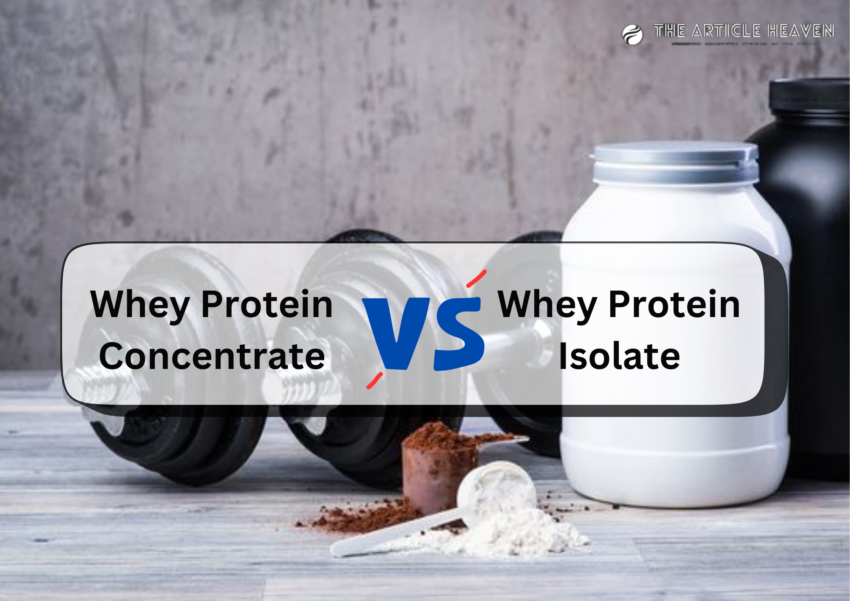Probably, whey protein is one of the most popular protein supplements which are available for anybody who wants to build muscle, support their recovery, or just adhere to a high-protein diet. However, when you look to buy some whey protein, probably you’ll find two types: whey protein concentrate and whey protein isolate. A glance over these two might be pretty similar, but there are certain differences which will impact the choice you’ll make.
In this article by The Article Heaven, We’ll break it down in simple terms so you can make the right choice for your health and fitness goals.
What Is Whey Protein?
Whey protein comes from milk. It is a complete protein that means it is a combination of all the nine essential amino acids which your body needs but cannot produce by itself. Whey is known as the liquid that separates when milk is turned into cheese. This whey then gets processed and turns into a powder that can be added to supplements.
Both whey concentrate and isolate come from this liquid whey; however, they are further processed differently in order to have slightly different nutritional profiles.
What is Whey Protein Concentrate?
Whey protein concentrate is the less processed form of whey protein. After filtering and drying the liquid whey, it still contains some fat and lactose, or milk sugar. This processing leaves it with a protein concentration of about 70-80%.
Protein Content: Typically 80% to 90% protein by weight
Other Nutrients: Small amounts of fats and carbs (lactose-based)
Taste & Texture: This will have a richer taste and texture since it is high in fat and lactose
What is Whey Protein Isolate?
Isolate is processed more than concentrate to give it all its fat and lactose. This leaves you with a powder that is about 90-95 percent protein by weight. With more processing comes a bigger price.
Whey isolate has a much higher protein content and lower lactose content, so it is generally suited for people with lactose sensitivity or someone who wants to get the greatest possible amount of protein with minimal intake of other nutrients.
Protein Content: Generally, about 90-95 percent protein by weight
Other Nutrients: Practically no fat or carbohydrates
Taste & Texture: Isolate tends to be lighter and less creamy than concentrate.
Major Differences Between Whey Concentrate vs. Whey Isolate
Now that we covered this general information, let’s get down to the differences that may sway your preference.
1. Protein Content
Whey Concentrate: 70-80% in weight protein, meaning you have more extra nutrients there like fats and carbs.
Whey Isolate: 90-95% protein by weight so you get a very pure protein with much less fat and carbs.
2. Lactose Content
Whey Concentrate: It contains lactose. If you are lactose intolerant or sensitive, that may lead to digestive troubles.
Whey Isolate: Contains very low lactose, therefore for people who are sensitive to lactose it can be more fitting.
3. Calories
Whey Concentrate: It has slightly more calories because of the extra fats and carbohydrates.
Whey Isolate: Slightly less calories in-a better choice if being more calorie-conscious is wanted.
4. Cost
Whey Concentrate: Cheaper to produce as not as much processing is required
Whey Isolate: More expensive since it requires extra filtering to have just protein
5. Digestibility
Whey Concentrate: Because of the lactose and fats, it digests slightly slower than isolate.
Whey Isolate: Less fats and lactose will digest more quickly, and timing can be critical post-workout for rapid recovery.
What’s Best for You?
Use Whey Protein Concentrate If
You’re Pinching Pennies
Whey concentrate is cheaper, so if you are keeping an eye on expenses, this could be your best bet.
If you Are Seeking a More Natural Supplement
Since whey concentrate is less processed, it may retain some of the desirable ingredients that are present in whole milk.
You’re Not Lactose Sensitive
If your body doesn’t break a sweat about lactose, you needn’t lose sleep over developing digestive disorders if you ever decide to drink whey concentrate.
Choose Whey Protein Isolate If
You Prefer Pure Protein
Because whey isolate has a higher protein concentration, you’d go for it if you’d prefer maximum protein by any scoop.
You’re Lactose Sensitive
The low count of lactose in whey isolate makes the latter less hazardous to the health of someone who is more likely to develop a reaction from lactose intolerance or sensitivity.
You Are Focused on Lean Muscle Building
If you are building lean muscle and keeping other macronutrients low, isolate is going to be a much better choice for you.
You Need Fast Absorption Post-Workout
Isolate is ever-so-slightly faster to digest, so it’s excellent for fast post-workout recovery.
It doesn’t have to be a headache choosing between whey protein concentrate and whey protein isolate. If you are a newbies to the fitness world and you are looking for a very affordable one, concentrate can give you everything you need. If you are an advanced one with your training or must see your calories or have a problem in lactose, isolate might be more helpful to use.
Knowing exactly what your objectives are, whether it’s to reach your fitness goals, a specific diet requirement, or even the budget, will guide you in selecting the best one for you. Both whey concentrate and isolate have unique benefits, so pick one that best fits your lifestyle, and let’s begin taking full advantage of using a high-quality protein source.
Check Out- Top 5 Whey Protein Under 2000 In India
